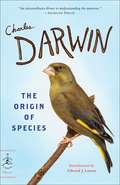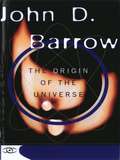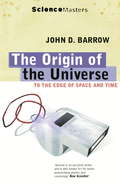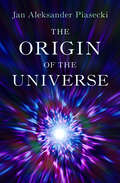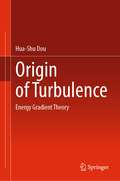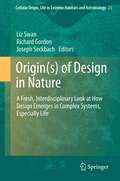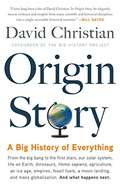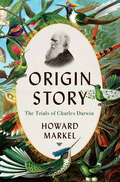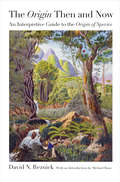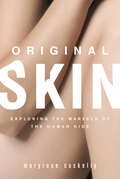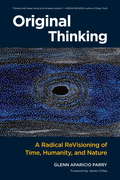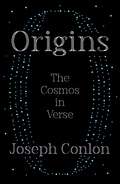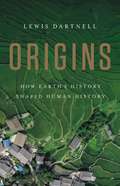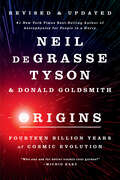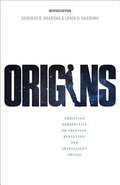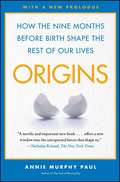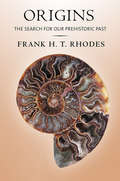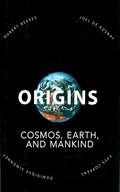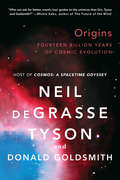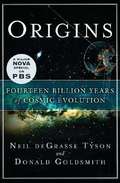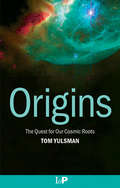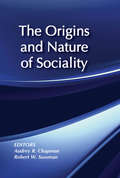- Table View
- List View
The Origin of the Species
by Charles DarwinTo celebrate the 150th anniversary of the publication of Charles Darwin's seminal 1859 work introducing the theory of evolution by natural selection, science writer and journalist Quammen presents the first edition text richly augmented by more than 350 images including historical photos and portraits, Darwin's own drawings, images of the places he went, the people he saw, the creatures he encountered, and the ship he traveled on. An informative introduction and extensive reproductions from The Voyage of the Beagle (Darwin's research travel narrative) as well as brief excerpts from his biography, diaries, and correspondence provide added perspective on who the man really was, how he came to develop his revolutionary theory, and how one of the most important and controversial books in history came to be. Annotation ©2009 Book News, Inc. , Portland, OR (booknews. com)
The Origin Of The Universe: Science Masters Series
by John D. BarrowThere is no more profound, enduring or fascinating question in all of science than that of how time, space, and matter began. Now John Barrow, who has been at the cutting edge of research in this area and has written extensively about it, guides us on a journey to the beginning of time, into a world of temperatures and densities so high that we cannot recreate them in a laboratory. With new insights, Barrow draws us into the latest speculative theories about the nature of time and the "inflationary universe,” explains "wormholes,” showing how they bear upon the fact of our own existence, and considers whether there was a "singularity” at the inception of the universe. Here is a treatment so up-to-date and intellectually rich, deaing with ideas and speculation at the farthest frontier of science, that neither novice nor expert will want to miss what Barrow has to say. The Origin of the Universe is ”In the Beginning” for beginners-the latest information from a first-rate scientist and science writer.
The Origin Of The Universe (SCIENCE MASTERS)
by John D. BarrowA leading cosmologist explains our current understanding of space and timeThere was immense excitement in the scientific community and among the general public when the COBE space probe sent back data that proved not only that the Big Bang had happened but also that it had happened at more or less exactly the time that astronomers had calculated. Barrow describes these finds and then goes on to explain how they allow us to reach back and shed light upon events at the dawn of time.What does it mean to say that the universe appeared out of nothing? Did it need a beginning, and will it ever end? Why do we think that most of the universe is invisible?The ideas that cosmologists are wrestling with are challenging and extraordinary: here they are explained with unfailing fluency.
The Origin of the Universe
by Jan Aleksander PiaseckiA philosophical approach to the enigma of nature and the universe approached through observation, meditation, and logical analysis of material phenomena. Written in accessible language for the general reader, The Origin of the Universe expounds on a theory that Jan Aleksander Piasecki developed from a synthesis of data he accumulated over the years. He discusses world forces and how they combine and operate to create the universe and matter, and all living things in it. A special section discusses the soul, its design and destiny. Attributing everything in the universe to the impact and expansion of the heat entity and the resistance and pressure of the cold entity, Piasecki moves through time and space to explain the creation of the sun, the solar system, atmosphere, water, and living forms. He draws a connection from outside forces to that which animates every &“self-moving form&” from within: the soul, imbued with the knowledge of its own being. From molecules to the moon, The Origin of the Universe takes readers on a journey through the mysteries of life, those with a finite existence and those that may endure forever . . .
Origin of Turbulence: Energy Gradient Theory
by Hua-Shu DouThis book presents the new discovery of the origin of turbulence from Navier–Stokes equations. The fully developed turbulence is found to be composed of singularities of flow field. The mechanisms of flow stability and turbulent transition are described using the energy gradient theory, which states all the flow instability and breakdown resulted from the gradient of the total mechanical energy normal to the flow direction. This approach is universal for flow instability in Newtonian flow and non-Newtonian flow. The theory has been used to solve several problems, such as plane and pipe Poiseuille flows, plane Couette flow, Taylor–Couette flow, flows in straight coaxial annulus, flows in curved pipes and ducts, thermal convection flow, viscoelastic flow, and magnet fluid flow, etc. The theory is in agreement with results from numerical simulations and experiments. The analytical method used in this book is novel and is different from the traditional approaches. This book includes the fundamental basics of flow stability and turbulent transition, the essentials of the energy gradient theory, and the applications of the theory to several practical problems. This book is suitable for researchers and graduate students.
Origin(s) of Design in Nature
by Liz Swan Richard Gordon Joseph SeckbachOrigin(s) of Design in Nature is a collection of over 40 articles from prominent researchers in the life, physical, and social sciences, medicine, and the philosophy of science that all address the philosophical and scientific question of how design emerged in the natural world. The volume offers a large variety of perspectives on the design debate including progressive accounts from artificial life, embryology, complexity, cosmology, theology and the philosophy of biology. This book is volume 23 of the series, Cellular Origin, Life in Extreme Habitats and Astrobiology. www.springer.com/series/5775
Origin Story: A Big History of Everything
by David Christian"I have long been a fan of David Christian. In Origin Story, he elegantly weaves evidence and insights from many scientific and historical disciplines into a single, accessible historical narrative." --Bill GatesA captivating history of the universe -- from before the dawn of time through the far reaches of the distant future.Most historians study the smallest slivers of time, emphasizing specific dates, individuals, and documents. But what would it look like to study the whole of history, from the big bang through the present day -- and even into the remote future? How would looking at the full span of time change the way we perceive the universe, the earth, and our very existence?These were the questions David Christian set out to answer when he created the field of "Big History," the most exciting new approach to understanding where we have been, where we are, and where we are going. In Origin Story, Christian takes readers on a wild ride through the entire 13.8 billion years we've come to know as "history." By focusing on defining events (thresholds), major trends, and profound questions about our origins, Christian exposes the hidden threads that tie everything together -- from the creation of the planet to the advent of agriculture, nuclear war, and beyond.With stunning insights into the origin of the universe, the beginning of life, the emergence of humans, and what the future might bring, Origin Story boldly reframes our place in the cosmos.
Origin Story: The Trials of Charles Darwin
by Howard MarkelA lively account of how Darwin’s work on natural selection transformed science and society, and an investigation into the mysterious illness that plagued its author. By early morning of June 30, 1860, a large crowd began to congregate in front of Oxford University’s brand-new Museum of Natural History. The occasion was the annual meeting of the British Association for the Advancement of Science, and the subject of discussion was Charles Darwin’s new treatise: fact or fiction? Darwin, a simultaneously reclusive and intellectually audacious squire from Kent, claimed to have solved “that mystery of mysteries,” introducing a logical explanation of the origin of species—how they adapted, even transmogrified, through natural selection. At stake, on that summer’s day of spirited debate, was the very foundation of modern biology, not to mention the future of the church. Without fear of exaggeration, Darwin’s thesis would forever change our understanding of the life sciences and the natural world. And yet the author himself was nowhere to be found in the debate hall—instead, he was miles away, seeking respite from a spate of illnesses that had plagued him for much of his adult life. In Origin Story, medical historian Howard Markel recounts the two-year period (1858 to 1860) of Darwin’s writing of On the Origin of Species through its spectacular success and controversy. Simultaneously, Markel delves into the mysterious health symptoms Darwin developed, combing the literature to emerge with a cogent diagnosis of a case that has long fascinated medical historians. The result is a colorful portrait of the man, his friends and enemies, and his seminal work, which resonates to this day.
The Origin Then and Now: An Interpretive Guide to the Origin of Species
by David N. ReznickAn accessible modern guide to Darwin's masterworkCharles Darwin's Origin of Species is one of the most widely cited books in modern science. Yet tackling this classic can be daunting for students and general readers alike because of Darwin's Victorian prose and the complexity and scope of his ideas. The "Origin" Then and Now is a unique guide to Darwin's masterwork, making it accessible to a much wider audience by deconstructing and reorganizing the Origin in a way that allows for a clear explanation of its key concepts. The Origin is examined within the historical context in which it was written, and modern examples are used to reveal how this work remains a relevant and living document for today.In this eye-opening and accessible guide, David Reznick shows how many peculiarities of the Origin can be explained by the state of science in 1859, helping readers to grasp the true scope of Darwin's departure from the mainstream thinking of his day. He reconciles Darwin's concept of species with our current concept, which has advanced in important ways since Darwin first wrote the Origin, and he demonstrates why Darwin's theory unifies the biological sciences under a single conceptual framework much as Newton did for physics. Drawing liberally from the facsimile of the first edition of the Origin, Reznick enables readers to follow along as Darwin develops his ideas.The "Origin" Then and Now is an indispensable primer for anyone seeking to understand Darwin's Origin of Species and the ways it has shaped the modern study of evolution.
Original Skin: Exploring the Marvels of the Human Hide
by Maryrose Cuskelly"Like the air we breathe, we take our skin for granted . . . Yet it is remarkable; it mitigates and ameliorates the sometimes harsh world we dwell in, and is at the interface of so much of what we encounter. It is our border, the edge of ourselves, the point where we meet our universe."Original Skin is at times a scientific study, remarking on the biological magic behind the human body's largest organ. At others it becomes an anthropological survey, dissecting separate societies' attitudes towards bare bodies, and the motives behind cultural rituals such as tattoos. However, Original Skin is, above all, a celebration of the human body; its tone one of absolute awe for the simultaneously protective and fragile membrane that divides us all from the world that surrounds us. Maryrose Cuskelly's book-in its examinations of everything from tickling to Botox to books bound in human derma-is a delightful meditation on skin.
Original Thinking
by James O'Dea Glenn Aparicio ParryIn Original Thinking, Glenn Aparicio Parry delves into the evolution of Western thought to recover the living roots of wisdom that can correct the imbalances in our modern worldview. Inspired by groundbreaking dialogues that the author organized between Native American elders and leading-edge Western scientists to explore the underlying principles of the cosmos, this book offers a radical revisioning of how we think. Asking questions such as, Is it possible to come up with an original thought?, What does it mean to be human?, and How has our thinking created our world today?, Parry challenges us to consider many of our most basic assumptions. To think originally--as in thinking new thoughts that have never been thought or said before--is according to Parry, largely an illusion. So, too, is the idea of linear human progress. Most of us have traveled far from our ancestral lands, and in so doing, lost connection with place, the origin of our consciousness.Original Thinking offers a radical revisioning of how we think and what it means to be human. It invites us to reintegrate our hearts with our heads and to expand our self-imposed narrowing of consciousness. In doing so we reconnect with the living, original source--nature and her interconnected elements and cycles--and embrace the communion of old and new, rational and intuitive, and masculine and feminine. Ultimately, Parry shows us how to create the tapestry of truly original thinking and to restore thought as a blessing, as a whole and complete transmission from Spirit.ContentsPART ONE (ORIGIN): Is it possible to come up with an original thought?Chapter 1. Original Thought, Time, and the Unfolding of ConsciousnessChapter 2. Looking Backward to Go ForwardChapter 3. Wheels Within Wheels Chapter 4. It's About Time PART TWO (DEPARTURE): What does it mean to be human? Chapter 5. Purpose, Potential, and Responsibility of Being Human Chapter 6. Rational Thought and Human Identity Chapter 7. Re-thinking Language Chapter 8. Beyond Rationality Chapter 9. A Tale of Two Directions PART THREE (RETURN): How has our thinking created the world today,and what is emerging? Chapter 10. The Essence of Thought Chapter 11. To Make Thought Whole Again Chapter 12. To Think Without Separation Chapter 13. Re-Thinking the "Dismal Science" Chapter 14. Toward An Original Economics PART FOUR (RENEWAL): Can education promote the renewal of original thinking? Chapter 15. Education as Renewal Chapter 16. Childhood and EducationChapter 17. Higher Education Chapter 18. A New (and Ancient) Vision Chapter 19. A Vision for Higher Education
Origins: The Lives and Worlds of Modern Cosmologists
by Roberta Brawer Alan LightmanBiographies and contributions based on interviews.
Origins: The Cosmos in Verse
by Joseph ConlonA poetic odyssey through the origins of the universe from one of Britain&’s leading physicists.There raged a thumping cosmic ballyhoo, A manic dance – a rumpus to arouse The universe: of Higgs and W, Electrons, gluons, muons, Zs and taus… For centuries poetry and science have been improbable, yet constant, bedfellows. Chaucer was an amateur astronomer; Milton broke bread with Galileo; and, before turning to the arts, Keats was a doctor. Meanwhile, scientific luminaries like Ada Lovelace and James Clerk Maxwell moonlighted as poets, composing verse between experiments and equations. Following in this tradition, theoretical physicist Joseph Conlon spins a dazzling intergalactic epic. Drawing on his scientific expertise, Conlon reveals the origins of our universe through two long-form poems – &‘Elements&’ and &‘Galaxies&’. Journeying from the Big Bang to the edges of our ever-expanding cosmos, Origins offers a delightful and revelatory adventure through contemporary physics.
Origins: How Earth's History Shaped Human History
by Lewis DartnellA New York Times-bestselling author explains how the physical world shaped the history of our speciesWhen we talk about human history, we often focus on great leaders, population forces, and decisive wars. But how has the earth itself determined our destiny? Our planet wobbles, driving changes in climate that forced the transition from nomadism to farming. Mountainous terrain led to the development of democracy in Greece. Atmospheric circulation patterns later on shaped the progression of global exploration, colonization, and trade. Even today, voting behavior in the south-east United States ultimately follows the underlying pattern of 75 million-year-old sediments from an ancient sea. Everywhere is the deep imprint of the planetary on the human. From the cultivation of the first crops to the founding of modern states, Origins reveals the breathtaking impact of the earth beneath our feet on the shape of our human civilizations.
Origins: Fourteen Billion Years Of Cosmic Evolution
by Donald Goldsmith Neil deGrasse Tyson“Who can ask for better cosmic tour guides?” —Michio Kaku Our true origins are not only human, or even terrestrial, but in fact cosmic. Drawing on recent scientific breakthroughs and cross-pollination among geology, biology, astrophysics, and cosmology, Origins illuminates the soul-stirring leaps in our understanding of the cosmos. This revised and updated edition features such startling discoveries as the now more than 5,000 detected exoplanets that promise to reveal exciting possibilities for life in the cosmos, and data from a new generation of ground-based and spaceborne observatories that have fundamentally changed what we know about the expanding universe?and maybe even the laws of physics themselves. From the first image of a galaxy’s birth to tantalizing evidence of water not only on Mars but also on the asteroid Ceres, as well as on moons of Jupiter and Saturn, coauthors Neil deGrasse Tyson and Donald Goldsmith conduct an exhilarating tour of the cosmos with clarity and exuberance.
Origins: Christian Perspectives on Creation, Evolution, and Intelligent Design
by Deborah B. Haarsma Loren D. HaarsmaWhen it comes to the history of the universe, many believe that science and faith are mutually exclusive. But in this revised version of Origins, physics professors Loren and Deborah Haarsma explore what God's Word and God's world teach us about creation, evolution, and intelligent design. Clearly explaining the science, the authors focus on areas where Christians agree. They also present the strengths and weaknesses of areas where Christians differ. Origins helps you develop a deeper understanding of the origins of the universe and sort out your own views on faith and science. Small group discussion questions follow each chapter. A companion website provides resources for further study.
Origins: How the Nine Months Before Birth Shape the Rest of Our Lives
by Annie Murphy PaulWhat makes us the way we are? Some say it's the genes we inherit at conception. Others are sure it's the environment we experience in childhood. But could it be that many of our individual characteristics--our health, our intelligence, our temperaments--are influenced by the conditions we encountered before birth?That's the claim of an exciting and provocative field known as fetal origins. Over the past twenty years, scientists have been developing a radically new understanding of our very earliest experiences and how they exert lasting effects on us from infancy well into adulthood. Their research offers a bold new view of pregnancy as a crucial staging ground for our health, ability, and well-being throughout life.Author and journalist Annie Murphy Paul ventures into the laboratories of fetal researchers, interviews experts from around the world, and delves into the rich history of ideas about how we're shaped before birth. She discovers dramatic stories: how individuals gestated during the Nazi siege of Holland in World War II are still feeling its consequences decades later; how pregnant women who experienced the 9/11 attacks passed their trauma on to their offspring in the womb; how a lab accident led to the discovery of a common household chemical that can harm the developing fetus; how the study of a century-old flu pandemic reveals the high personal and societal costs of poor prenatal experience. Origins also brings to light astonishing scientific findings: how a single exposure to an environmental toxin may produce damage that is passed on to multiple generations; how conditions as varied as diabetes, heart disease, and mental illness may get their start in utero; why the womb is medicine's latest target for the promotion of lifelong health, from preventing cancer to reducing obesity. The fetus is not an inert being, but an active and dynamic creature, responding and adapting as it readies itself for life in the particular world it will enter. The pregnant woman is not merely a source of potential harm to her fetus, as she is so often reminded, but a source of influence on her future child that is far more powerful and positive than we ever knew. And pregnancy is not a nine-month wait for the big event of birth, but a momentous period unto itself, a cradle of individual strength and wellness and a crucible of public health and social equality.With the intimacy of a personal memoir and the sweep of a scientific revolution, Origins presents a stunning new vision of our beginnings that will change the way you think about yourself, your children, and human nature itself.
Origins: How the Nine Months Before Birth Shape the Rest of Our Lives
by Annie Murphy PaulWhat makes us the way we are? Some say it's the genes we inherit at conception. Others are sure it's the environment we experience in childhood. But could it be that many of our individual characteristics--our health, our intelligence, our temperaments--are influenced by the conditions we encountered before birth? That's the claim of an exciting and provocative field known as fetal origins. Over the past twenty years, scientists have been developing a radically new understanding of our very earliest experiences and how they exert lasting effects on us from infancy well into adulthood. Their research offers a bold new view of pregnancy as a crucial staging ground for our health, ability, and well-being throughout life. Author and journalist Annie Murphy Paul ventures into the laboratories of fetal researchers, interviews experts from around the world, and delves into the rich history of ideas about how we're shaped before birth. She discovers dramatic stories: how individuals gestated during the Nazi siege of Holland in World War II are still feeling its consequences decades later; how pregnant women who experienced the 9/11 attacks passed their trauma on to their offspring in the womb; how a lab accident led to the discovery of a common household chemical that can harm the developing fetus; how the study of a century-old flu pandemic reveals the high personal and societal costs of poor prenatal experience. Origins also brings to light astonishing scientific findings: how a single exposure to an environmental toxin may produce damage that is passed on to multiple generations; how conditions as varied as diabetes, heart disease, and mental illness may get their start in utero; why the womb is medicine's latest target for the promotion of lifelong health, from preventing cancer to reducing obesity. The fetus is not an inert being, but an active and dynamic creature, responding and adapting as it readies itself for life in the particular world it will enter. The pregnant woman is not merely a source of potential harm to her fetus, as she is so often reminded, but a source of influence on her future child that is far more powerful and positive than we ever knew. And pregnancy is not a nine-month wait for the big event of birth, but a momentous period unto itself, a cradle of individual strength and wellness and a crucible of public health and social equality.With the intimacy of a personal memoir and the sweep of a scientific revolution, Origins presents a stunning new vision of our beginnings that will change the way you think about yourself, your children, and human nature itself.
Origins: The Search for Our Prehistoric Past
by Frank H. Rhodes"Fossils are the fragments from which, piece by laborious piece, the great mosaic of the history of life has been constructed. Here and there, we can supplement these meager scraps by the use of biochemical markers or geochemical signatures that add useful information, but, even with such additional help, our reconstructions and our models of descent are often tentative. For the fossil record is, as we have seen, as biased as it is incomplete. But fragmentary, selective, and biased though it is, the fossil record, with all its imperfections, is still a treasure. Though whole chapters are missing, many pages lost, and the earliest pages so damaged as to be, as yet, virtually unreadable, this—the greatest biography of all—is one in whose closing pages we find ourselves."—from OriginsIn Origins, Frank H. T. Rhodes explores the origin and evolution of living things, the changing environments in which they have developed, and the challenges we now face on an increasingly crowded and polluted planet. Rhodes argues that the future well-being of our burgeoning population depends in no small part on our understanding of life's past, its long and slow development, and its intricate interdependencies.Rhodes’s accessible and extensively illustrated treatment of the origins narrative describes the nature of the search for prehistoric life, the significance of geologic time, the origin of life, the emergence and spread of flora and fauna, the evolution of primates, and the emergence of modern humans.
Origins: Cosmos, Earth, and Mankind
by Joel De Rosney Yves Coppens Hubert Reeves Dominique SimonnetIn this potent book, three eminent scientists--an astrophysicist, an organic chemist, and an anthropologist--ponder and discuss some of the basic questions that have obsessed humankind through the ages, and offer thoughtful, enlightening answers in terms the layperson can easily understand. Until now, most of these questions were addressed by religion and philosophy. But science has reached a point where it, too, can voice an opinion. Beginning with the Big Bang roughly fifteen billion years ago, the authors trace the evolution of the cosmos, from the first particles, the atoms, the molecules, the development of cells, organisms, and living creatures, up to the arrival of Homo erectus and Homo sapiens. Proactive, informative, and free of technical or scientific jargon, Origins offers compelling insights into how the universe, life on Earth, and the human species began.
Origins: Fourteen Billion Years of Cosmic Evolution
by Neil Degrasse Tyson Donald Goldsmith"Who can ask for better cosmic tour guides to the universe than Drs. Tyson and Goldsmith?" --Michio Kaku, author of Hyperspace and Parallel Worlds Our true origins are not just human, or even terrestrial, but in fact cosmic. Drawing on recent scientific breakthroughs and the current cross-pollination among geology, biology, astrophysics, and cosmology, ?Origins? explains the soul-stirring leaps in our understanding of the cosmos. From the first image of a galaxy birth to Spirit Rover's exploration of Mars, to the discovery of water on one of Jupiter's moons, coauthors Neil deGrasse Tyson and Donald Goldsmith conduct a galvanizing tour of the cosmos with clarity and exuberance.
Origins: Fourteen Billion Years of Cosmic Evolution
by Neil Degrasse Tyson Donald GoldsmithThis book explores new insights into the formation and evolution of our universe. It explains the breakthroughs in our knowledge of the universe from dark energy to life on Mars to the mysteries of space and time.
Origins: The Quest for Our Cosmic Roots
by Tom YulsmanWith stunning regularity, the search for our cosmic roots has been yielding remarkable new discoveries about the universe and our place in it. In his compelling book, Origins: The Quest for Our Cosmic Roots addresses some of the most profound issues humans have ever confronted. In his compelling book, veteran science journalist Tom Yulsman chronicles the latest discoveries and describes in clear and engaging terms what they mean. From the interior of protons to the outer reaches of the universe, and from the control room of one of the world's most powerful particle accelerators to an observatory atop the tallest mountain in the Pacific basin, Yulsman takes readers on a fantastic voyage at the cutting edge of science.
The Origins and Nature of Sociality
by Robert W. SussmanScientific developments have increasingly been transforming our understanding of the place of human beings in nature. The contributors to this book focus on the current status of research on sociality and the evolution of cooperative and altruistic behaviour in non-human and human primates. They examine questions related to the evolution, cultural viability, and hormonal underpinnings of human sociality in specific detail, and describe patterns of sociality that shed light on human social behaviour.
